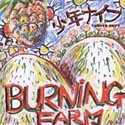
Shonen Knife
Burning Farm/Yama-no Attchan/Pretty Little Baka Guy/712 [Reissues]
Oglio
It’s nearly impossible to believe that Japan’s biggest musical export, Shonen Knife, is still going strong after twenty years. They’ve seen new wave at its apex, on its deathbed and at its resurrection; they’ve watched punk’s transformation from gutter to mall. They’ve done this soldiering on below the radar the whole way.
Shonen Knife was probably received on these shores as a joke, at best a future footnote in the annals of underground rock. Consciously revered or not, their longevity has made them of one of old guard in independent music. It’s fitting, then, that the band’s first four albums would finally qualify for an official U.S. release, completely remastered and boasting live bonus tracks to boot.
The band was on sturdy footing from the first note of their first album, 1983’s Burning Farm. As lo-fi and off-balance as they come, the disc harkened back to the late ’70s AM days of new punk rather than the over-produced hubris of new wave in the ’80s. The first track, “Miracles,” cuts straight to the group’s best quality: its eccentricities. The song features a choral bridge of “meows,” though the lyrics don’t contain the slightest allusion to cats. It’s genius. Later, the band lifts the “na na” vocal melody from “Devil With a Blue Dress On” and inserts it into the title track. The Japanese and broken English lyrics are all undeniably fun, but it’s the instrumentation that’s most remarkable. Guitarist Nakao Yamano plays with her guitar’s range enough to keep the tone interesting from song to song. The group is also comfortable introducing Eastern aesthetics into the mix, as with the clattering percussion on the title song.
1984’s Yama-no Attchan saw the band moving backward in terms of sound, but excelling in song quality. This disc is much more inspired by the roots of rock & roll, the ’50s and the ’60s. It’s more easily digestible, much more kitsch and a lot more pop than their debut. Shonen Knife’s trademark muses are still in place: food, animals and the occasional combination of the two. The album has one of their best songs, “Flying Jelly Attack,” which boasts a sing-song verse that goes, “I’m gonna eat jelly [x8] beans/you’re gonna eat cherry [x8] drops.” Yama is also where the idiosyncratic songwriting of bassist Michie Nakatani started to come into its own. Her nervy, Talking Heads-esque arrangements on “Cannibal Papaya” and “Dali’s Sunflower” are great counterparts to Yamano’s straightforward leanings.
Two years later, on Pretty Little Baka Guy, the group reverted back to the power-pop Ramones formula, with expanded sound and songwriting. The disc was SK’s first concerted attempt at English lyrics; they managed to fill nearly half the album before easing back into the more comfortable Japanese. Musically, Baka Guy is their most accomplished and cohesive statement to date. Both Yamano and Nakatani were taking leads from one another, carving out a niche distinctly their own. Highlights like the loung-y, quasi-commercial jingle “I Wanna Eat Chocobars” and the woozy artic headache of “Ice Cream City” help make this the definitive Shonen Knife album.
712 rounds out the reissues. Originally released in 1988, the disc plays like the band’s first real attempt at crossing over to a U.S. audience. The result is incredibly overwhelming. The opening track alone features sampled riffs from ’60s British acts (The Beatles’ “Ticket to Ride” and The Who’s “Substitute”), hip-hop drums and rapping! Add to that songs called “Blue Oyster Cult” and “Redd Kross,” a cover of The Beatles’ “Rain” and John Lennon and Yoko Ono’s “The Luck of the Irish” – inexplicably sung by Redd Kross frontman Jeff McDonald – and it feels like there was some third party piloting Shonen Knife’s ship at that point. It’s not a bad album by any means, but it lacks a good deal of the charm found on the band’s previous discs.
For longtime fans, there’s gold, in varying degrees, to be found on all four of these re-releases. Newbies would be wise to check out Baka Guy or Yama before delving into the bookends, but it’s (mostly) all quality rock music from a very unlikely source.
Oglio: http://www.oglio.com












